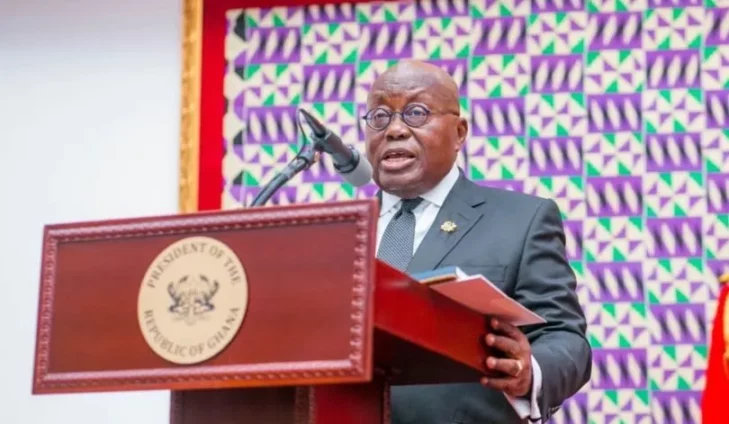President Akufo-Addo announced on Tuesday, February 27, that Ghana had reclaimed its status as Africa’s largest gold producer, surpassing South Africa.
He said that was because of the progressive policies that the government had implemented, which has led to the revival of dormant mines like the Obuasi and Bibiani Mines, and the expansion of existing ones.
“Our gold production reached an unprecedented four million ounces, according to preliminary reports. The reduction in withholding tax on unprocessed gold by small-scale miners, from three per cent to one and a half per cent has resulted in some 900 per cent increment in gold export from the small-scale sector, over the last two years.
“Leveraging on these resources, we introduced the innovative Gold for Oil Policy, which accounts for some 30% of our total crude oil consumption,” he said.
President Akufo-Addo made this known when he delivered the State of the Nation’s Address on Tuesday, in Parliament.
He said that three large-scale mines were currently under development in the Ahafo, Upper East, and Upper West regions, with Cardinal Namdini planning to pour its first gold in the Upper East Region in the fourth quarter of this year.
“With these new mines, our gold production is expected to increase to some four point five million ounces (4.5 million oz) annually.”
The President stated that to add value to these amounts of production, the government has built a 400-kilogram gold refinery through a public-private partnership and is in the final stages of negotiating a London Bullion Market Association (LBMA) Certificate.
“For our green minerals, including lithium, we have put in place a policy for their exploitation and management, to ensure beneficiation across the value chain of these critical minerals.”
On Irrigation, the President said the government had begun the development of 7,100 hectares of irrigation infrastructure in five identified economic enclaves within the Afram Plains Agricultural Zone.
He said work was also continuing towards the completion of the Tamne Phase III Extension and Vea Irrigation Schemes, saying this would make an additional 1,250 hectares of irrigable land available for cultivation of rice and vegetables.
He said the Ghana Irrigation Development Authority would continue with the development of small earth dams in the Northern, Upper East, Upper West, North East and Savannah Regions to support the “One- Village, One Dam” (1V1D) Initiative.
Latest Stories
-
OmniBSIC Bank relocates Osu branch to enhance customer experience
3 minutes -
GES confirms burial of one student, vows to probe drowning of 7 Lawra SHS students
3 minutes -
From 8 As in WASSCE to First Class at UG: The inspiring story of Emmanuel Annor
9 minutes -
PRINCOF to serve only one daily meal to teacher trainees over financial constraints
33 minutes -
CLOGSAG directs staff to strike over alleged misconduct by acting Births and Deaths Registrar
42 minutes -
Moving Health and Trotula Fund equip Tumu midwifery college
48 minutes -
Justice Dzamefe opposes gagging investigative journalism in defence of judiciary
1 hour -
Ofosu Kwakye appeals for tax exemptions to sustain struggling state media
1 hour -
Report facts, not perceptions – Justice Dzamefe tells journalists
1 hour -
Judgements are based on evidence not on friendships – Justice Dzamefe
1 hour -
Judiciary is not financially independent – Justice Dzamefe
1 hour -
‘Forget women, smoking and drinking’ if you want to be World Champion – Bukom Banku
2 hours -
Justice Dzamefe proposes timelines for court cases to enhance justice delivery
2 hours -
Global conference on human resources in Africa slated in August
2 hours -
Frederick Asare calls Kotoko’s FA Cup triumph a ‘special day’
2 hours

